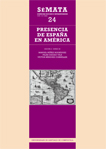INTERSECCIONALIDADE E MUDANÇAS CLIMÁTICAS: UM ESTADO DA ARTE SOBRE O RACISMO AMBIENTAL NO BRASIL E SEUS OUTROS
Contenido principal del artículo
Resumen
O presente artigo busca explorar o potencial da interseccionalidade como ferramenta analítica para a compreensão das atuais dimensões das mudanças climáticas. Traz resultados do estado da arte acerca da interface dos temas racismo ambiental e suas interseccionalidades em obras nacionais e internacionais que abordam os efeitos das mudanças climáticas. A pesquisa foi feita nas plataformas SciELo, Scopus e Latindex, no período entre 2012 e 2021, na qual selecionou-se um total de quinze trabalhos classificados como elegíveis para a presente análise. Concluiu-se que nos últimos anos está crescendo o número de trabalhos, no entanto ainda existem muitas lacunas, principalmente em pesquisas sobre o contexto brasileiro, que tendem a não reconhecer as peculiaridades das relações dos diferentes sujeitos e grupos sociais com as mudanças climáticas. Assim sendo, a ausência de pesquisas científicas em torno dessa temática impossibilita a construção de ferramentas capazes de analisar a complexidade das injustiças presentes na sociedade brasileira.
Palabras clave:
Detalles del artículo
Referencias
Acselrad, H.: Mello, C. C. do A. e Bezerra, G. das N. (2009): O que é justiça ambiental, Garamond, 2009.
Akotirene, C. (2019): Interseccionalidade, Pólen Livros.
Almeida, S. (2019): Racismo Estrutural, Pólen Livros.
Bilge, S. (2013): «Intersectionality Undone: Saving Intersectionality from Feminist Intersectionality Studies», Du Bois Review: Social Science Research on Race, 10 (2), pp. 405-424.
Collins, P. H. (2019): Intersectionality as critical social theory, Duke University Press.
Collins, P. H; Bilge, S. (2021): Interseccionalidade, Boitempo Editorial.
Crenshaw, K. (2002): «Documento para o encontro de especialistas em aspectos da discriminação racial relativos ao gênero», Estudos feministas, 171 (1), pp. 171-188.
Crenshaw, K. (1991): «Mapping the Margins: Intersectionality, Identity Politics, and Violence against Women of Color», Stanford Law Review, 43, pp. 1241-1299.
Cunha Junior, H. (2018): Espaço Público, Urbanismo e População Negra, Appris.
Ferreira, N. S. de A. (2002): «As pesquisas denominadas ‘estado da arte’», Educação & Sociedade, 23 (79), pp. 257-272.
Giddens, A. (2009): The politics of climate change, Polity.
Gonzlez, L. (2020): Por um feminismo afro-latino: ensaios, intervenções e diálogos, Zahar.
Hancock, A. (2016): Intersectionality: an intellectual history, Oxford University Press.
Held, D. et al. (2001): The governance of climate change. science, politics and ethics, Polity.
Hemmati, M. e Röhr, U. (2009): «Engendering the climate-change negotiations: experiences, challenges, and steps forward», Gender and Development, 17 (1), pp. 19-32.
Hirata, H. (2014): «Gênero, classe e raça Interseccionalidade e consubstancialidade das relações sociais», Tempo Social, pp. 61-73.
Kaijser, A. e Kronsell, A. (2014): «Climate change through the lens of intersectionality», Environmental Politics, 26 (1), pp. 417-433.
Kergoat, D. (2010): «Dinâmica e consubstancialidade das relações sociais», Novos estudos CEBRAP, 86, pp. 93-103.
Lykke, N. (2009): «Non-innocent intersections of feminism and environmentalism», Women, Gender and Research, 3-4, pp. 36-44.
Mendes, J. M. et al. (2011): «A vulnerabilidade social aos perigos naturais e tecnológicos em Portugal», Revista Crítica de Ciências Sociais, Centro de Estudos Sociais da Universidade de Coimbra, 93, pp. 95-128.
Neal, Z. (2010): «Seeking common ground: three perspectives on public space», Urban Design and Planning, 163 (2), pp. 59-66.
Newell, P. e Paterson, M. (2010): Climate capitalism. Global warming and the transformation of the global economy, Cambridge University Press.
Puar, J. (2013): «‘Prefiro ser um ciborgue a ser uma deusa’: interseccionalidade, agenciamento e política afetiva», Meritum, Revista de Direito da Universidade FUMEC, 8 (2), pp. 343-370.
Silva, L. H. P. (2012): «Ambiente e justiça: sobre a utilidade do conceito de racismo ambiental no contexto brasileiro», E-cadernos CES, 17, pp. 85-111.
Terry, G. (2009): «No climate justice without gender justice: an overview of the issues», Gender and Development, 17 (1), pp. 5-18.
Urry, J. (2001): Climate change and society, Polity.
Yuval-Davis, N. (2006): «Intersectionality and Feminist Politics», European Journal of Women’s Studies, 13 (3), pp. 193-209.







